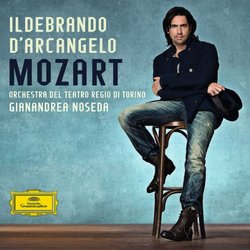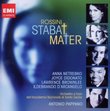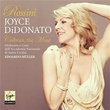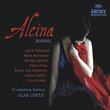| All Artists: Ildebrando D' Arcangelo Orchestra Del Teatro Regio Title: Mozart: Arias Members Wishing: 0 Total Copies: 0 Label: Deutsche Grammophon Release Date: 9/13/2011 Genre: Classical Style: Opera & Classical Vocal Number of Discs: 1 SwapaCD Credits: 1 UPC: 028947792970 |
Search - Ildebrando D' Arcangelo Orchestra Del Teatro Regio :: Mozart: Arias
 | Ildebrando D' Arcangelo Orchestra Del Teatro Regio Mozart: Arias Genre: Classical
ILDEBRANDO D'ARCANGELO SINGS MOZART "Mozart is my god," says Ildebrando D'Arcangelo simply. "He is the composer who inspired in me the passion for music and my career." Right from the bass-baritone's 1994 breakthrough per... more » |
Larger Image |
CD Details
Synopsis
Product Description
ILDEBRANDO D'ARCANGELO SINGS MOZART "Mozart is my god," says Ildebrando D'Arcangelo simply. "He is the composer who inspired in me the passion for music and my career." Right from the bass-baritone's 1994 breakthrough performance in Parma as Leporello under Gardiner (available on Archiv 445 8702), which established the young singer as a velvet-voiced charmer with a brilliant line in stage comedy, to the recent triumphant addition of Don Giovanni to his repertoire, Mozart has been central to the singer's work. "I feel that he is my `house composer', and I think - I hope - my voice is ready to do him justice." The composer's most popular baritone and bass-baritone roles are handsomely represented in D'Arcangelo's recital. From Don Giovanni we find Leporello listing his master's prodigious sexual conquests [track 1], and also meet the libidinous Giovanni himself, first descanting on the delights of instant gratification [10] and then serenading a distant beauty [8]. From Le nozze di Figaro we first encounter Figaro planning to outwit his employer's stratagems [2-3] and later fulminating on the faithlessness of women [12-13]. In [18-19] Figaro's master, the Count, swears to get his revenge on his uppity domestics. From Così fan tutte there's the naive Guglielmo setting out to test his lover's fidelity [11] and then, like Figaro, blustering when he thinks that his lover is less than pure [16]. These roles have been the staple of D'Arcangelo's career. "I started out as Masetto in Don Giovanni," he explains, "and was able to watch some of the greatest Leporellos and Giovannis perform on stage. Now I have my own ideas about how those roles can be performed, and I want to find the right emotions, and my own vocal colours for these parts." He especially likes to do his own research. "There are so many fascinating questions. Did you know that Luigi Bassi, the first interpreter of the title role in Don Giovanni, was just 21 when he created it? So perhaps it should be performed with a voice that's more youthful and brillante. Or is a more mature Giovanni preferable? It's interesting to think about this." Is there anything common to all Mozart roles? "Precision. You have to be as precise as possible. This isn't like Verdi, where a large orchestra can help you out. You're more exposed, and you have to be absolutely clear." Given D'Arcangelo's history with Mozart then, it's no surprise to find Giovanni, Figaro and Guglielmo here. But he has also chosen some much more out of the way - and extremely challenging - repertoire. There's even the world premiere [6] of a new critical edition of a lost recitative from Figaro, prepared by the eminent musicologist Francesco Lora. This short piece, written for the baritone Francesco Benucci, was only discovered in the 1930s. From internal evidence, it appears that it was composed to precede the familiar aria Non più andrai [7] in which Figaro teases the cosseted young pageboy Cherubino about his future life in the army (Benucci was Mozart's first Figaro). Some experts have doubted Mozart's authorship, but after having battled for many hours to retrieve the original manuscript from a safe in Florence, and having made an exhaustive study of the musical style and literary text, Lora asserts confidently "that the recitative is without doubt attributable to Mozart". His new critical edition restores the lost viola part, and can be heard here for the first time. The other items include some rarely performed concert arias. "They're not often sung because of their difficulty," explains the soloist. "You need a huge vocal range and considerable agility. But I love a challenge." Per questa bella mano, a lover's vow of fidelity, was written for Franz Gerl, the first Sarastro. "It has notes so deep that it pushes the singer to the edge of his voice," says D'Arcangelo, "but my range has been expanding steadily since the beginning of my career, and I wanted to exploit that." The aria also contains an obbligato for double bass, fearsome in its extreme virtuosity. One amusing explanation - possibly apocryphal - for the difficulty of the writing is that Mozart wished to humiliate the bass player, who was apparently making sheep's eyes at his wife. Three other arias also written to showcase a wide vocal range are Così dunque... Aspri rimorsi (a concert aria in which a faithless lover hypocritically complains of being betrayed), Alcandro, lo confesso... Non so d'onde (another concert piece in which King Clistene confronts his son, whom he had thought long dead) and Mentre ti lascio (a painful farewell to a daughter, written for insertion in Paisiello's opera La disfatta di Dario). These all date from the years of Mozart's late, great operas, and the first two were written for the German bass Ludwig Fischer, who created the role of Osmin in Die Entführung aus dem Serail. As to the recording itself, it was a happy experience. D'Arcangelo says it was important to work with one of his favourite Italian orchestras in this repertoire. "We worked like a family," he says. "The orchestra had been planning a strike, but agreed to make this recording because of our close relationship. Thinking like a team is vital for Mozart opera. And working with Gianandrea Noseda, it was like being with a brother. Or maybe even closer - like Leporello and Don Giovanni!" Warwick Thompson

 Track Listings (19) - Disc #1
Track Listings (19) - Disc #1


